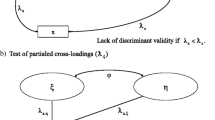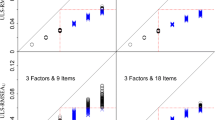Abstract
Ordinal measures are frequently encountered in travel behavior research. This paper presents a new method for combining them when a hierarchical structure of the data can be presumed. This method is applied to study the subjective assessment of the amount of travel by different transportation modes among a group of French clerical workers, along with the desire to increase or decrease the use of such modes. Some advantages of this approach over traditional data reduction technique such as factor analysis when applied to ordinal data are then illustrated. In this study, combining evidence from several variables sheds light on the observed moderately negative relationship between the personal assessment of the amount of travel and the desire to increase or decrease it, thus integrating previous partial (univariate) results. We find a latent demand for travel, thus contributing to clarify the behavioral mechanisms behind the induced traffic phenomenon. Categorizing the above relationship by transportation mode shows a desire for a less environmental-friendly mix of modes (i.e., a greater desire to use heavy motorized modes and a lower desire to use two-wheeled modes), whenever the respondents do not feel to travel extensively. This result, combined with previous theoretical investigations concerning the determinants of the desire to alter trips consumption levels, shows the importance of making people aware of how much they travel.








Similar content being viewed by others
Notes
For simplicity, “frequent users (of a given mode)” from here on reflects Subjective Mobility, i.e., “those who think to use (a given mode) a lot”, rather than the amount of travel that is actually done.
References
Aarts, H., Dijksterhuis, A.: The automatic activation of goal-directed behaviour: the case of travel habit. J. Environ. Psychol. 20(1), 75–82 (2000)
Abelson, P.W., Hensher, D.: Induced travel and user benefits: clarifying definitions and measurement for urban road infrastructure. In: Button, K.J., Hensher, D.A. (eds.) Handbook of Transport Systems and Traffic Control, pp. 121–141. Pergamon, Amsterdam (2001)
Akritas, M.G., Arnold, S.F., Brunner, E.: Nonparametric hypotheses and rank statistics for unbalanced factorial designs—Part I. J. Am. Stat. Assoc. 92(437), 258–265 (1997)
Anable, J.: ‘Complacent car addicts’ or ‘aspiring environmentalists’? Identifying travel behaviour segments using attitude theory. Transp. Pol. 12(1), 65–78 (2005)
Anable, J., Gatersleben, B.: All work and no play? The role of instrumental and affective factors in work and leisure journeys by different travel modes. Transp. Res. Part A 39(2–3), 163–181 (2005)
Bagge, C.L., Stepp, S.D., Trull, T.J.: Borderline personality disorder features and utilization of treatment over two years. J. Personal. Disord. 19(4), 420–439 (2005)
Bamberg, S., Ajzen, I., Schmidt, P.: Choice of travel mode in the theory of planned behavior: the roles of past behavior, habit, and reasoned action. Basic Appl. Soc. Psychol. 25(3), 175–187 (2003)
Blair, R.C., Sawilowsky, S.S., Higgins, J.J.: Limitations of the rank transform statistic in tests for interactions. Commun. Stat. 16(4), 1133–1145 (1987)
Bollen, K.A.: Exploratory and confirmatory factor analysis. In: Bollen, K.A. (ed.) Structural Equations with Latent Variables, pp. 226–232. Wiley, New York (1989)
Brookins, O.T.: Factor analysis and gross national product: a comment. Q. J. Econ. 84(4), 648–650 (1970)
Cherchye, L., Vermeulen, F.: Robust rankings of multidimensional performances: an application to Tour de France racing cyclists. J. Sports Econ. 7(4), 359–373 (2006)
Cherchye, L., Vermeulen, F.: Acknowledgement of priority. J. Sports Econ. 8(5), 557 (2007)
Choo, S., Collantes, G.O., Mokhtarian, P.L.: Wanting to travel, more or less: exploring the determinants of the deficit and surfeit of personal travel. Transportation 32(2), 135–164 (2005)
Collantes, G.O., Mokhtarian, P.L.: Subjective assessments of personal mobility: what makes the difference between a little and a lot? Transp. Pol. 14(3), 181–192 (2007)
Conover, W.J., Iman, R.L.: Rank transformations as a bridge between parametric and nonparametric statistics. Am. Stat. 35, 124–134 (1981)
Denvil, C. (ed.): Special issue on induced traffic. Transportation 23(1), 1–119 (1996)
Diana, M.: An Exploratory Web-Based Attitudinal Travel Survey Administered to INRETS Staff. Les Collections de l’INRETS – “Outils et méthodes” n°12, Arcueil, France, 187 pp, ISBN 2-85782-623-0 (2005)
Diana, M.: Making the “primary utility of travel” concept operational: a measurement model for the assessment of the intrinsic utility of reported trips. Transp. Res. Part A 42(3), 455–474 (2008)
Diana, M., Mokhtarian, P.L.: The individual desire to change a “modal basket” and its relationship with the actual and perceived use of different transport means. In: 11th World Congress on Transport Research, Berkeley, USA, 41 pp. (2007)
Diana, M., Mokhtarian, P.L.: Desire to change one’s multimodality and its relationship to the use of different transport means. Transp. Res. Part F 12(2), 107–119 (2009). doi:10.1016/j.trf.2008.09.001
Dobson, R., Tischer, M.L.: Perceptual market segmentation technique for transportation analysis. Transp. Res. Rec. 673, 145–152 (1978)
Flamm, M.: Comprendre le choix modal – Les déterminants des pratiques modales et des représentations individuelles des moyens de transport. Ph.D. Thesis, Ecole Polytechnique Fédérale de Lausanne, Lausanne, Switzerland, 307 pp. (2003)
Fligner, M.A.: Rank transformations as a bridge between parametric and nonparametric statistics—comment. Am. Stat. 35, 131–132 (1981)
Gärling, T., Fujii, S., Boe, O.: Empirical tests of a model of determinants of script-based driving choice. Transp. Res. Part F 4(2), 89–102 (2001)
Garvill, J., Marell, A., Nordlund, A.: Effects of increased awareness on choice of travel mode. Transportation 30(1), 63–79 (2003)
Gensch, D.H., Torres, P.T.: Perceived-difference segmentation model for mass transit marketing. Transp. Res. Rec. 765, 16–22 (1980)
Haas, C.N.: On modeling correlated random variables in risk assessment. Risk Anal. 19(6), 1205–1214 (1999)
Johansson, M.: Psychological motivation of pro-environmental travel behaviour in an urban area. In: Rothengatter, T., Huguenin, R.D. (eds.) Traffic and Transport Psychology—Theory and Application, pp. 435–442. Proceedings of the ICTTP 2000, Elsevier, Amsterdam, Netherlands (2004)
Jöreskog, K.G., Moustaki, I.: Factor analysis of ordinal variables: a comparison of three approaches. Multivar. Behav. Res. 36(3), 347–387 (2001)
Lemmer, H.H., Stoker, D.J., Reinach, S.G.: A distribution-free analysis of variance technique for block designs. S. Afr. Stat. J. 2, 9–32 (1968)
Mokhtarian, P.L., Salomon, I.: How derived is the demand for travel? Some conceptual and measurement considerations. Transp. Res. Part A 35(8), 695–719 (2001)
Mokhtarian, P.L., Salomon, I., Redmond, L.: Understanding the demand for travel: it’s not purely “derived”. Innov. Eur. J. Soc. Sci. Res. 14(4), 355–380 (2001)
Noland, R.B., Lem, L.L.: A review for the evidence of induced travel and changes in transportation and environmental policy in the US and the UK. Transp. Res. Part D 7(1), 1–26 (2002)
Outwater, M.L., Castleberry, S., Shiftan, Y., Ben-Akiva, M., Zhou, Y.S., Kuppam, A.: Attitudinal market segmentation approach to mode choice and ridership forecasting—structural equation modeling. Transp. Res. Rec. 1854, 32–42 (2003)
Paczesny, S., Banchereau, J., Wittkowski, K.M., Saracino, G., Fay, J., Palucka, A.K.: Expansion of melanoma-specific cytolytic CD8+ T cell precursors in patients with metastatic melanoma vaccinated with CD34+ progenitor-derived dendritic cells. J. Exp. Med. 199(11), 1503–1511 (2004)
Salomon, I., Mokhtarian, P.L.: What happens when mobility-inclined market segments face accessibility-enhancing policies? Transp. Res. Part D 3(3), 129–140 (1998)
Sapir, M., Verbel, D., Kotsianti, A., Saidi, O.: Live logicTM: method for approximate knowledge discovery and decision making. In: Ślęzak, D., Wang, G., Szczuka, M., Düntsch, I., Yao, Y. (eds.) Rough Sets, Fuzzy Sets, Data Mining, and Granular Computing—10th International Conference, RSFDGrC 2005. Proceedings, Part 1, Lecture Notes in Artificial Intelligence, vol. 3641, pp. 532–540. Springer, Berlin (2005)
Shah, D.A., Madden, L.V.: Nonparametric analysis of ordinal data in designed factorial experiments. Phytopathology 94(1), 33–43 (2004)
Spangler, R., Wittkowski, K.M., Goddard, N.L., Avena, N.M., Hoebel, B.G., Leibowitz, S.F.: Opiate-like effects of sugar on gene expression in reward areas of the rat brain. Mol. Brain Res. 124(2), 134–142 (2004)
Steg, L., Vlek, C., Slotegraaf, G.: Instrumental-reasoned and symbolic-affective motives for using a motor car. Transp. Res. Part F 4(3), 151–169 (2001)
Stradling, S.G., Meadows, M.L., Beatty, S.: Identity and independence: two dimension of driver autonomy. International conference on traffic and transport psychology—ICTTP 2000, 12 pp. Bern (2000)
Tardiff, T.J.: Attitudinal market segmentation for transit design, marketing, and policy analysis. Transp. Res. Rec. 735, 1–7 (1979)
Thøgersen, J.: Understanding repetitive travel mode choices in a stable context: a panel study approach. Transp. Res. Part A 40(8), 621–638 (2006)
TRB—Transportation Research Board: Preferences, perceptions, and market segments in travel behavior. Transp. Res. Rec. 649, 1–48 (1977)
Verplanken, B., Aarts, H., van Knippenberg, A., van Knippenberg, C.: Attitude versus general habit: antecedents of travel mode choice. J. Appl. Soc. Psychol. 24(4), 285–300 (1994)
Verplanken, B., Aarts, H., van Knippenberg, A.: Habit, information acquisition, and the process of making travel mode choices. Eur. J. Soc. Psychol. 27(5), 539–560 (1997)
Wittkowski, K.M., Lee, E., Nussbaum, M., Chamian, F.N., Krueger, J.G.: Combining several ordinal measures in clinical studies. Stat. Med. 23(10), 1579–1592 (2004)
Acknowledgements
The survey originating the dataset that has been used in the present research was implemented thanks to the support of INRETS, the French National Institute for Transport and Safety Research. The project was also supported in part by Grant Number UL1RR024143 from the U.S. National Center for Research Resources (NCRR). Comments from three anonymous referees helped to improve a previous version of the paper.
Author information
Authors and Affiliations
Corresponding author
Rights and permissions
About this article
Cite this article
Diana, M., Song, T. & Wittkowski, K.M. Studying travel-related individual assessments and desires by combining hierarchically structured ordinal variables. Transportation 36, 187–206 (2009). https://doi.org/10.1007/s11116-009-9186-z
Published:
Issue Date:
DOI: https://doi.org/10.1007/s11116-009-9186-z




